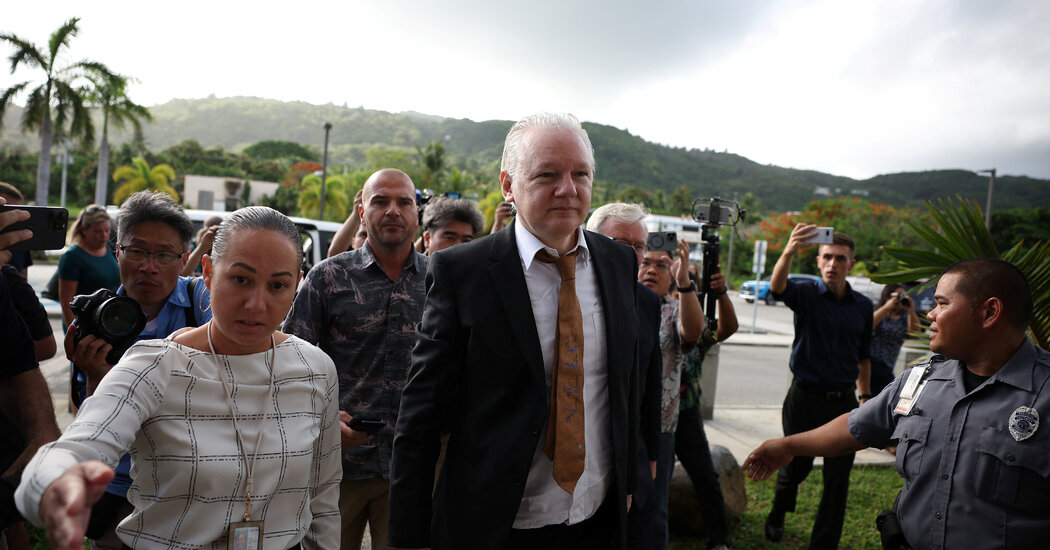Breaking News
Rogue to Victim: What Australia Sees in Julian Assange

Julian Assange, the founder of WikiLeaks, was welcomed as a hero in Australia upon his return after pleading guilty to a felony charge of violating the U.S. Espionage Act. Australian politicians quickly showed their support for his plea deal, with even former Prime Minister Kevin Rudd appearing in the U.S. courtroom on the island of Saipan.
The conclusion of Mr. Assange’s case in a remote location like the Northern Mariana Islands seemed fitting, given the nature of the charges against him. After years of legal battles, he was finally free from the American government’s pursuit.
Initially a divisive figure, Mr. Assange’s time in a British prison transformed him into a more sympathetic figure for many Australians. His release was seen as a victory for the underdog against superpower influence, resonating with the Australian value of giving everyone a fair go.
Prime Minister Anthony Albanese welcomed the court’s decision to free Mr. Assange, emphasizing the need for a fair and transparent legal process. However, critics pointed out Australia’s own strict espionage laws and lack of protections for journalism.
The broad political support for Mr. Assange in Australia surprised many, with politicians from different parties coming together to advocate for his release. His case shifted from a legal matter to a humanitarian issue, drawing attention to the treatment he received.
While Americans focused on the implications for journalism and free speech, Australians viewed Mr. Assange’s case in the context of geopolitical dynamics and Western hypocrisy. The desire to protect accountability journalism was not a primary concern in Australia, where the culture of secrecy differs from that in the United States.
Australians’ skepticism of the U.S. criminal justice system contributed to the support for Mr. Assange, with concerns about fairness and transparency. Secretary of State Antony J. Blinken’s defense of the charges against Mr. Assange was met with criticism in Australia, highlighting the complex relationship between the two countries.
The case of Mr. Assange symbolizes Australia’s ambivalence towards American exceptionalism and the dynamics of the alliance between the two nations. Australian politicians celebrated his release as a victory for transparency and justice, but the future implications of his actions remain uncertain.
-

 Destination8 months ago
Destination8 months agoSingapore Airlines CEO set to join board of Air India, BA News, BA
-

 Breaking News10 months ago
Breaking News10 months agoCroatia to reintroduce compulsory military draft as regional tensions soar
-

 Gadgets4 months ago
Gadgets4 months agoSupernatural Season 16 Revival News, Cast, Plot and Release Date
-

 Tech News12 months ago
Tech News12 months agoBangladeshi police agents accused of selling citizens’ personal information on Telegram
-

 Productivity11 months ago
Productivity11 months agoHow Your Contact Center Can Become A Customer Engagement Center
-

 Gadgets4 weeks ago
Gadgets4 weeks agoFallout Season 2 Potential Release Date, Cast, Plot and News
-

 Breaking News10 months ago
Breaking News10 months agoBangladesh crisis: Refaat Ahmed sworn in as Bangladesh’s new chief justice
-

 Toys12 months ago
Toys12 months ago15 of the Best Trike & Tricycles Mums Recommend























